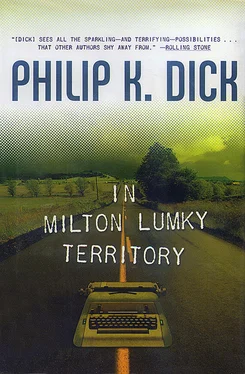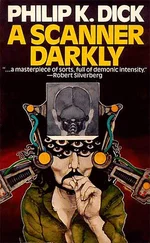Philip Dick - In Milton Lumky Territory
Здесь есть возможность читать онлайн «Philip Dick - In Milton Lumky Territory» весь текст электронной книги совершенно бесплатно (целиком полную версию без сокращений). В некоторых случаях можно слушать аудио, скачать через торрент в формате fb2 и присутствует краткое содержание. Город: New York, ISBN: , Издательство: Tom Doherty Associates, LLC, Жанр: roman, на английском языке. Описание произведения, (предисловие) а так же отзывы посетителей доступны на портале библиотеки ЛибКат.
- Название:In Milton Lumky Territory
- Автор:
- Издательство:Tom Doherty Associates, LLC
- Жанр:
- Год:неизвестен
- Город:New York
- ISBN:978-0-7653-1695-0
- Рейтинг книги:4 / 5. Голосов: 1
-
Избранное:Добавить в избранное
- Отзывы:
-
Ваша оценка:
- 80
- 1
- 2
- 3
- 4
- 5
In Milton Lumky Territory: краткое содержание, описание и аннотация
Предлагаем к чтению аннотацию, описание, краткое содержание или предисловие (зависит от того, что написал сам автор книги «In Milton Lumky Territory»). Если вы не нашли необходимую информацию о книге — напишите в комментариях, мы постараемся отыскать её.
In Milton Lumky Territory — читать онлайн бесплатно полную книгу (весь текст) целиком
Ниже представлен текст книги, разбитый по страницам. Система сохранения места последней прочитанной страницы, позволяет с удобством читать онлайн бесплатно книгу «In Milton Lumky Territory», без необходимости каждый раз заново искать на чём Вы остановились. Поставьте закладку, и сможете в любой момент перейти на страницу, на которой закончили чтение.
Интервал:
Закладка:
At eleven-thirty Susan said good-night and went off to the bathroom to take a bath and go to bed.
Alone, he sat in the living room, watching an old movie on the TV set.
I have moved back to Montario, he thought. No, not exactly to Montario. This is actually Boise. But to him it was the same; it was the place he had come from.
However, it did not discourage him. It was so different. Nothing could be further from the old days, his life as a high school student folding up newspapers and flinging them onto porches…or, before that, playing marbles after school, watching Howdy Doody on the ten-inch TV screen in the family living room, while his older brother Frank messed about on the back porch with pond water for his microscope.
That made him meditate about Frank.
His older brother Frank now worked in Cincinnati for a chemical company, as a research chemist. He had gone through Wayne University, in Detroit, on a scholarship granted by a soap company. Frank was married and he had a child three years old. How old would Frank be? Twenty-six or so. And he owned—or was paying on—a house and car. So Frank was a success, by any standards; he held a professional job, doing what he had enjoyed all his life…he was talented, alert, skilled, and one day he would be publishing in scientific journals. He had a great future; in fact, he had a great present. In school Frank had been popular. Bruce remembered him striding about in his tennis shoes and slacks, his hair combed back and oiled, his skin shining and blemish-free, waving at everyone, being good at school dances, being elected to this and that. Going steady with Ludmilla Meadowland, the blonde whom the senior class had elected Miss Montario for the JC pageant of 1948. In the parade, on June tenth, she had coasted down Hill Street on a float made of potatoes, carrying a banner reading WIN MONTARIO HIGH WIN WIN. The Principal of Montario High had shaken hands with both her and Frank, and the picture of the three of them had appeared in the Gazette , the newspaper which Bruce had trudged along with, folding and tossing, folding and tossing day after day, for two whole years.
All his life everyone had dropped it in his ear that his brother Frank was the bright one.
Evidently, he thought, it was true. Look where Frank is. Look where I am.
But, try as he might, he could not drum up a feeling of discouragement. I like this, he thought. I’m getting a deep charge out of this…it really appeals to me. There is something satisfying about it, a kind of order. A unity. That someone from his early life could have the power to pull him over backward this way made him feel that all those years had not after all added up to nothing. In those days he had naturally been powerless to help himself. He had done what everyone else did. They shot marbles after school, so he did so, too. They went and stood in line for the kiddies’ matinee at the Luxury Theater on Saturday afternoon, so he did so, too, whatever crummy film might be showing. Those repetitious and futile years had been so tiresome that, now and then, he had despaired. What was it all about? What did he get out of it? Nothing, apparently.
Practically the only moment in his first fifteen years that had meant anything to him at the time had shown up by accident. The Gazette had run an offer to mail out phonograph records of great symphonic masterpieces for coupons clipped from the daily paper. Since he was a carrier, he had access to the coupons, and he had gathered a batch and sent them off to Illinois, and after a month or so he had received in the mail a flat package wrapped with brown paper and tape. Opening it, he had found three twelve-inch records bundled up in cardboard. The labels on the records were blue and read only “World’s Greatest Symphonies.” The names of the orchestra and the conductor were not given. This particular set of records—it had no album, only paper sleeves—turned out to be the Haydn Symphony Number 99. He played it on his table-model phonograph, which he had gotten as a Christmas present during junior high. Up to then his musical taste had run to Spike Jones, and after that it more or less still did. But that particular symphony had had an enormous impact on him; it had affected him to the soles of his feet. He played the three records until they turned white and wore away into noisy hissing.
His rabid interest in the music proved that if given a choice he would have swapped his life as he was living it for a different town, other people. It proved that he was not happy. Of course, he knew that. He moped continually about, from home to school and back. What a contrast to his brother Frank, who sailed out daily in the best grade of sweater, slacks, and hair oil.
At fifteen he had lain by himself in the darkness of his room, listening to the music on the phonograph. Sharpening the cactus needles with the little machine that he had bought for a dollar and a half that spun the needle around a disc of sandpaper…collecting a Band-Aid box of sharpened needles ready to be stuck in, half way through a record side, if the needle in the arm began to wear too much.
He could have lived entirely in that room, if someone had thought to push food through the keyhole. Piped in by means of a tube, he thought. Perhaps that had been the defect. Outside the room he had suffered. He could not keep the thing with him. And he did like to get out once in awhile and stir around and see what was doing. Eventually he had wound up in Reno working for C.B.B. And in the same manner he had wound up back here, intrigued by things that had fallen in his direction, unable to turn down a chance at something that promised to be new.
When the old movie ended he shut off the TV set, made certain that the front door of the house was locked, turned off the living room light as Susan had at great pains instructed him to do, and then eyed the bathroom to be sure Susan was out. It looked good and dark, so he went into his room, got a towel from his suitcase, and crossed the hall to it. Soon he was washing and brushing, preparing for bed.
In his room he lay tossing restlessly, unable to sleep. Insomnia had plagued him in his childhood and here it was back, probably because this was Boise once more and because he was so reminded, in the last day or so, of the old days.
What pill did he have that he could take? Somewhere he owned a bottle of antihistamine pills, supposedly for allergies and colds, but he had found that antihistamines put him into a relaxed doze and he kept the bottle for that. No doubt it was in the glove compartment of the Merc. For another hour he lay, but still he did not sleep. So at last he got up, put on his blue wool bathrobe and his leather slippers, and set out through the dark house toward the front door.
He successfully reached the car, but he did not find the bottle in the glove compartment. So he had to return to the house, up the dark path and onto the porch and into the living room, without it. Maybe it had been stuck in his suitcase and had filtered down out of sight, among the shoes. Thinking that, he started along the hall to his room, back where he had begun.
Before he could open his door another door opened and Susan looked out into the hall. “Oh,” she said. “I thought possibly it was Taffy.”
“I left something in the car,” he said.
He opened the door to his room.
“I don’t want you to worry,” she said, from behind him.
“About what?” he said.
“About anything. You seem distraught.”
“I just can’t get to sleep,” he said. “All the excitement.” He entered his room and took a look at the clock.
Susan followed after him into the room. She wore a long pink quilt-like robe, with a narrow ropy sash. Her hair floated down in a great number of loose, light strands, without apparent weight. It came to rest on her shoulders, much longer than he had seen it to be before. “I have some phenobarbital,” she said.
Читать дальшеИнтервал:
Закладка:
Похожие книги на «In Milton Lumky Territory»
Представляем Вашему вниманию похожие книги на «In Milton Lumky Territory» списком для выбора. Мы отобрали схожую по названию и смыслу литературу в надежде предоставить читателям больше вариантов отыскать новые, интересные, ещё непрочитанные произведения.
Обсуждение, отзывы о книге «In Milton Lumky Territory» и просто собственные мнения читателей. Оставьте ваши комментарии, напишите, что Вы думаете о произведении, его смысле или главных героях. Укажите что конкретно понравилось, а что нет, и почему Вы так считаете.










